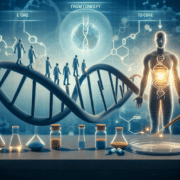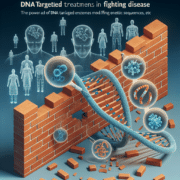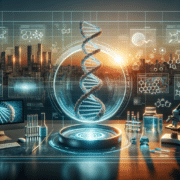Revolutionizing Medicine – How DNA Targeted Treatments Are Changing the Game
Revolutionizing Medicine – How DNA Targeted Treatments Are Changing the Game
Advancements in healthcare technology have paved the way for DNA
DNA (Deoxyribonucleic Acid) is a molecule that carries the genetic instructions used in the growth, development, fun... More targeted treatments, revolutionizing the practice of medicine. These personalized therapies are designed to target specific genes or mutations that are unique to each individual, allowing for more precise and effective treatment options. In this article, we will explore how DNA targeted treatments are changing the game in healthcare.
Benefits of DNA Targeted Treatments
-
- Personalized approach to treatment
-
- More effective and precise treatment options
-
- Reduction in adverse side effects
-
- Improved patient outcomes
How DNA Targeted Treatments Work
DNA targeted treatments involve analyzing an individual’s genetic makeup to identify specific genes or mutations that are associated with a particular disease or condition. This information is then used to develop personalized treatment plans that target these genetic factors, allowing for more tailored and effective therapies.
Key Features of DNA Targeted Treatments
-
- Genetic testing to identify target genes
-
- Customized treatment plans based on genetic makeup
-
- Ongoing monitoring and adjustments to treatment as needed
Applications of DNA Targeted Treatments
DNA targeted treatments are being used in a variety of medical specialties, including oncology, cardiology, and neurology. These personalized therapies are helping to improve outcomes for patients with a wide range of diseases and conditions, including cancer, heart disease, and neurological disorders.
Common Conditions Treated with DNA Targeted Treatments
-
- Certain types of cancer
-
- Cardiovascular diseases
-
- Neurological disorders
-
- Autoimmune conditions
Challenges and Future Directions
While DNA targeted treatments offer promising benefits, there are also challenges that need to be addressed. These include issues related to genetic testing accuracy, access to genetic testing services, and cost considerations. However, ongoing research and advancements in technology are helping to address these challenges and pave the way for the future of personalized medicine.
Future Directions in DNA Targeted Treatments
-
- Integration of artificial intelligence and machine learning in genetic analysis
-
- Development of more targeted and precise therapies
-
- Expansion of genetic testing services to improve accessibility
-
- Collaboration between healthcare providers, researchers, and technology companies
Overall, DNA targeted treatments are revolutionizing the practice of medicine, offering a more personalized and effective approach to treatment. As technology continues to advance and our understanding of genetics grows, we can expect to see even more innovative and impactful therapies in the future.







